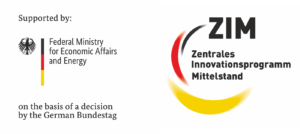Recycling for Textiles
The ZIM network RE4TEX focuses on activities around the recycling of textile production waste.
The production of tearing fibres from old textiles and their processing into textile products has been an effective recycling solution for centuries and is therefore one of the oldest material cycles in the world. As the products of the textile industry continue to develop, the perspective requirements for textile recycling will also increase. The legislator demands a significant increase of the material recycling quotas through the Recycling Management Act. As a reaction to this, not only capacity increases through more effective technology are required, but also new technical/technological solutions to meet the required quotas are indicated. The ZIM cooperation network RE4TEX® meets these extended challenges.
In phase 1 (04/2019 to 03/2020) the focus was on the establishment of the network and the creation of the technological roadmap. This roadmap contains a compilation of the planned project ideas and forms the basis for all R&D projects of the network.
After completion of phase 1 the formed network consortium consists of 14 regular and 10 associated partners. The commercial enterprises represent the sectors of production, finishing and processing of technical textiles. They are complemented by companies from the sector-related textile machinery and special machinery construction. The research institutes are focused on technical textiles, textile recycling, smart textiles and textile machine engineering.
In phase 2, the focus is on the submission as well as the implementation and execution of the project applications. The formation of a steering group and the identification of further project ideas are also planned. Based on the diversity of the product fields functional textiles, textile semi-finished products and smart textiles, development priorities of the network were defined, which are reflected in the projects:
– Processing of production waste that cannot be processed into tear fibers
– Recycling of Smart Textiles
– Recycling of special fiber materials
– Direct processing of textile production waste
As an efficient association of industry and research, the network partners are in a position to potentiate individual competences for this complex material area, to use synergies, to develop unconventional methods and to set milestones in the transformation of recycling from a “necessary evil” to a perspectively important source of raw materials. The long-term consequence will be a significant reduction of textile waste within the German textile and clothing industry that has not been recycled or disposed of so far.
The following effects are expected for the network partners:
– Development of new markets through technologies or products developed in the network
– Synergies, long-term cooperation and expansion of know-how between the companies involved
– Increasing the competitiveness of the partners involved
– Extended cooperation relationships through newly integrated companies
– Increasing the level of awareness of German companies and their know-how in textile recycling



